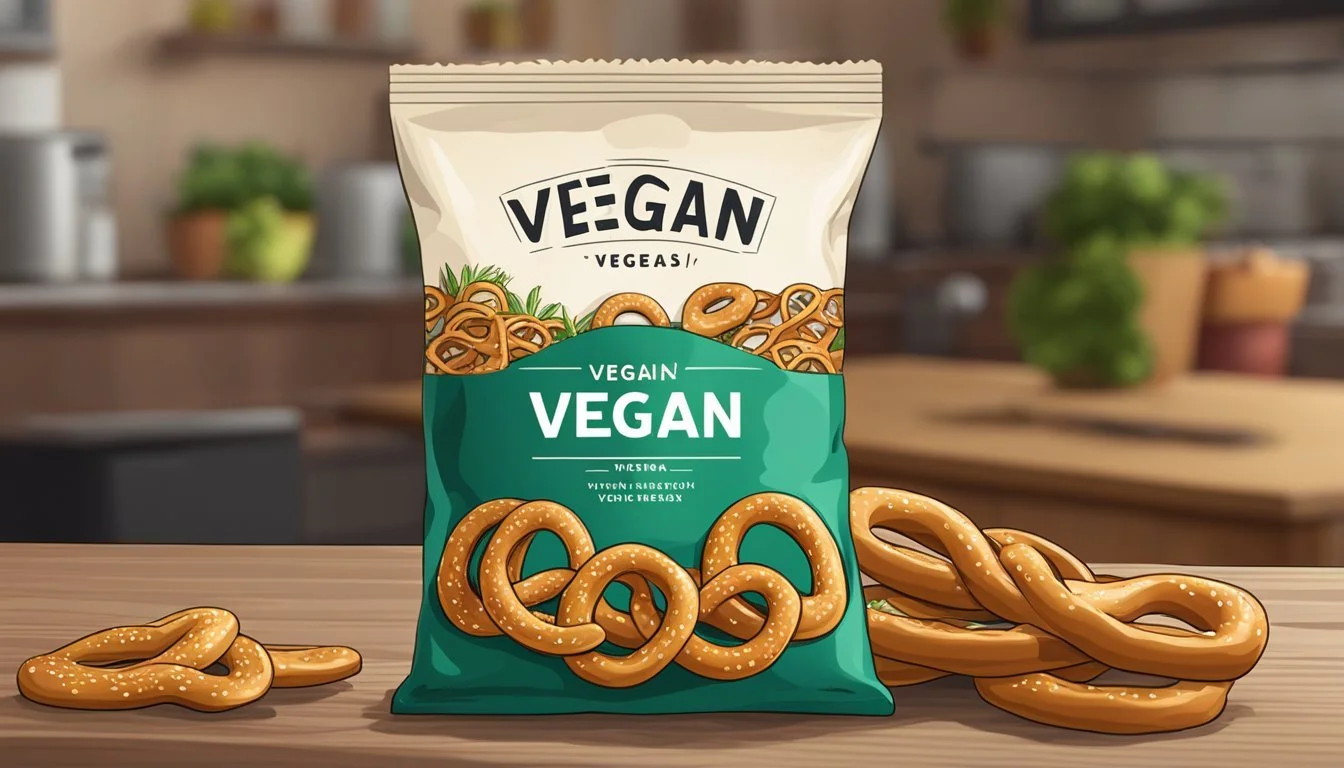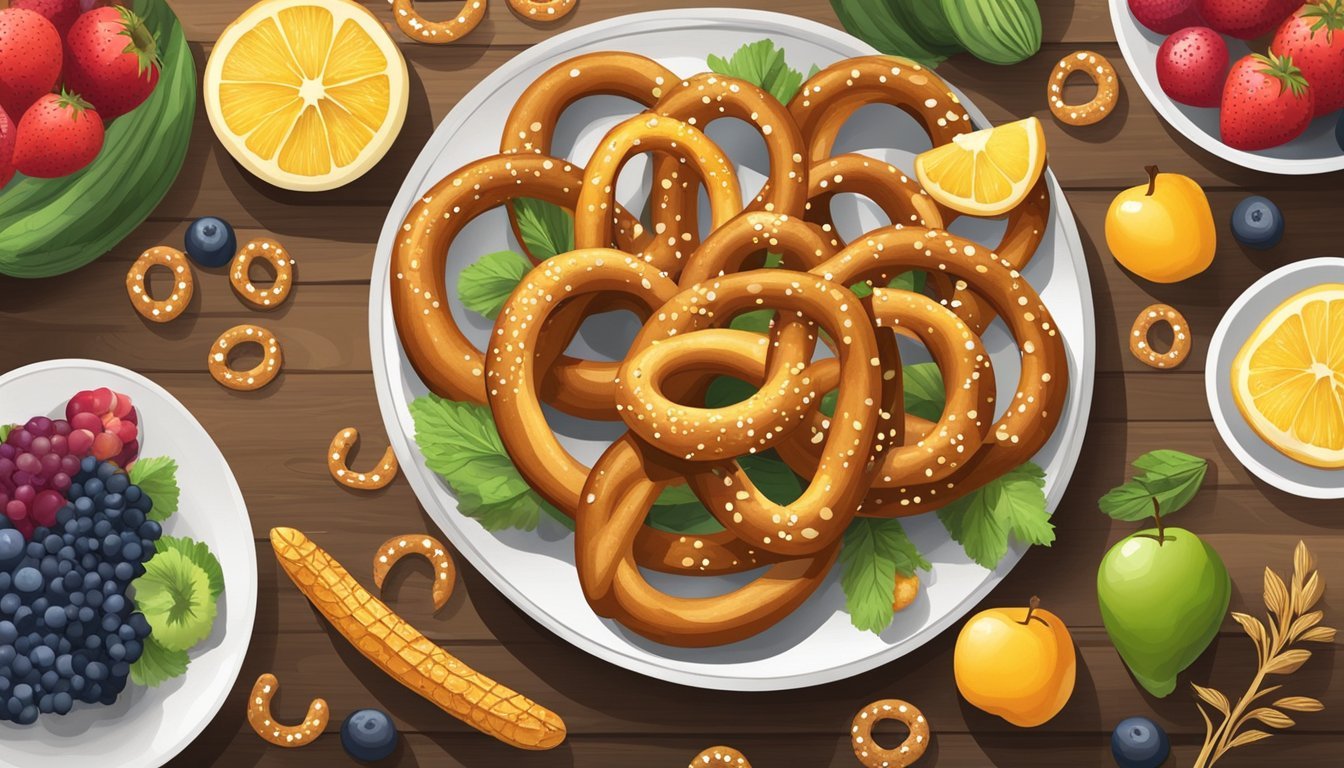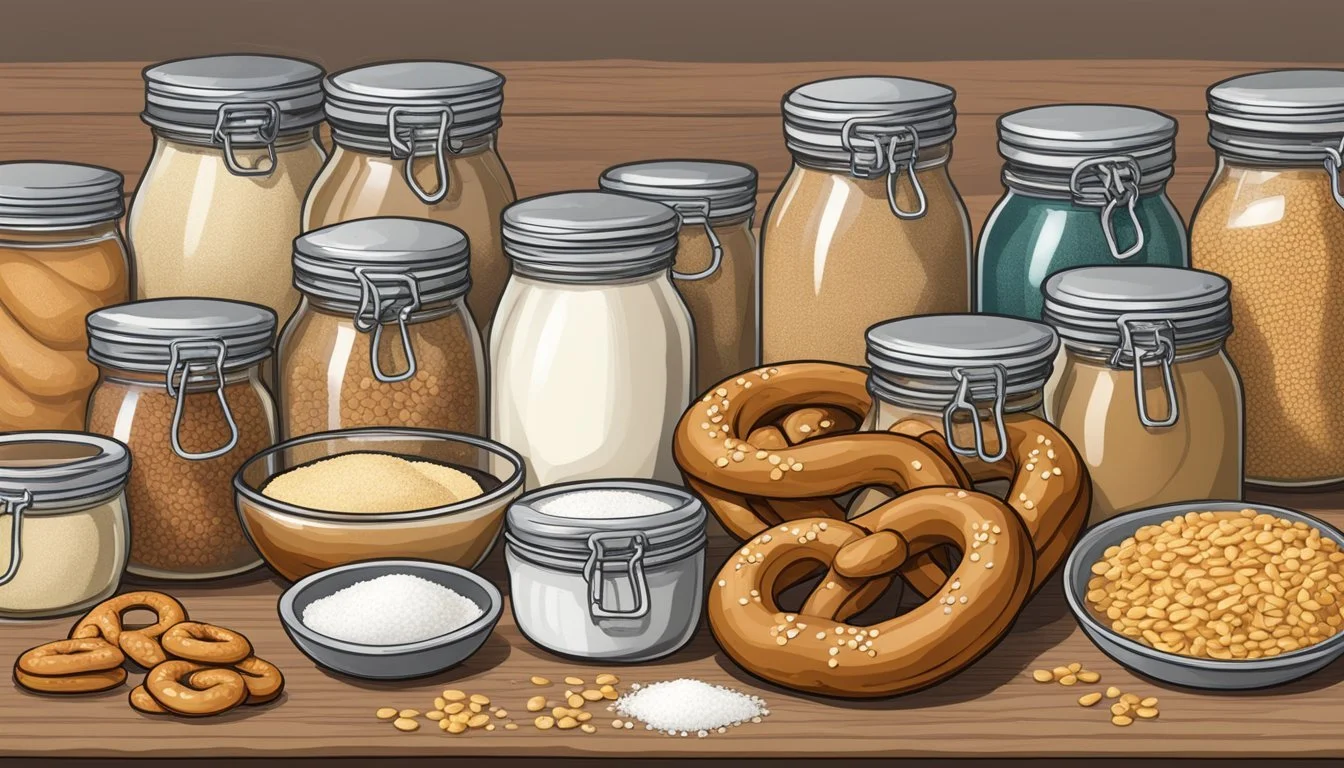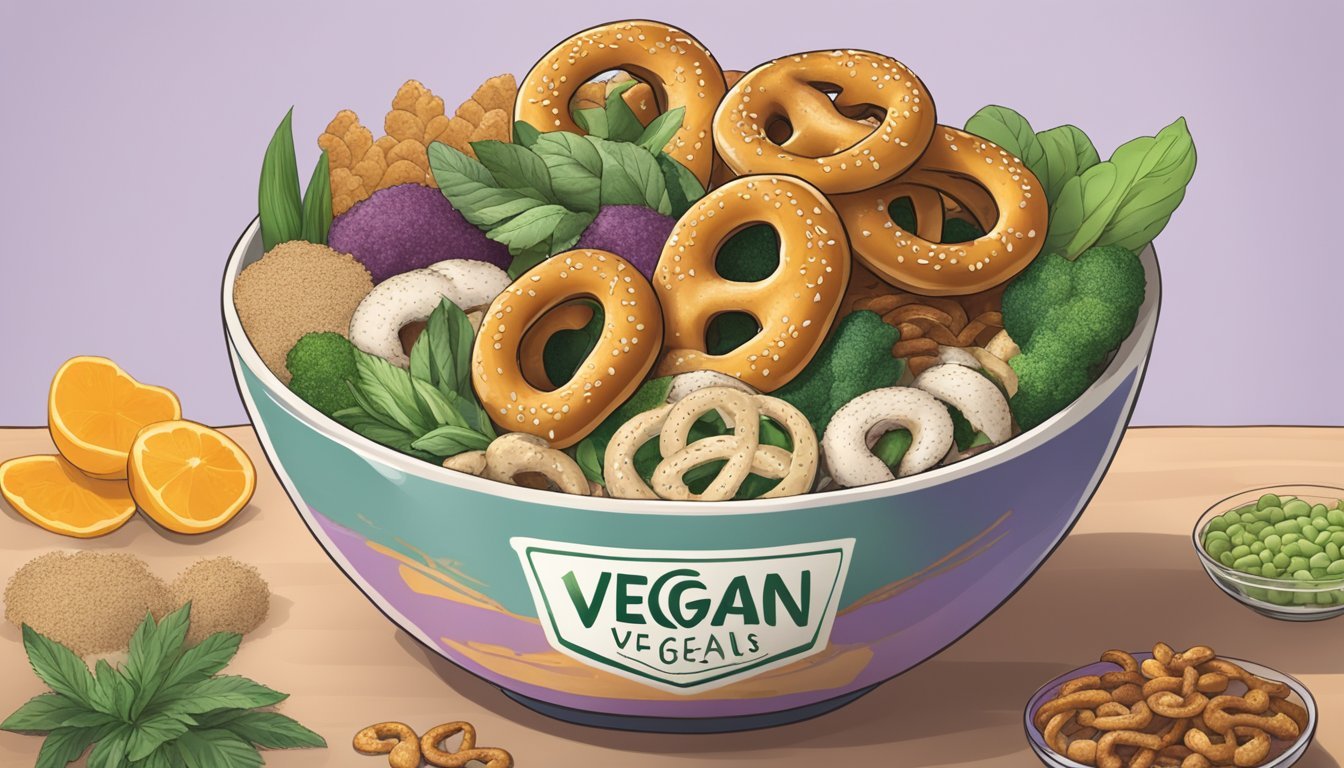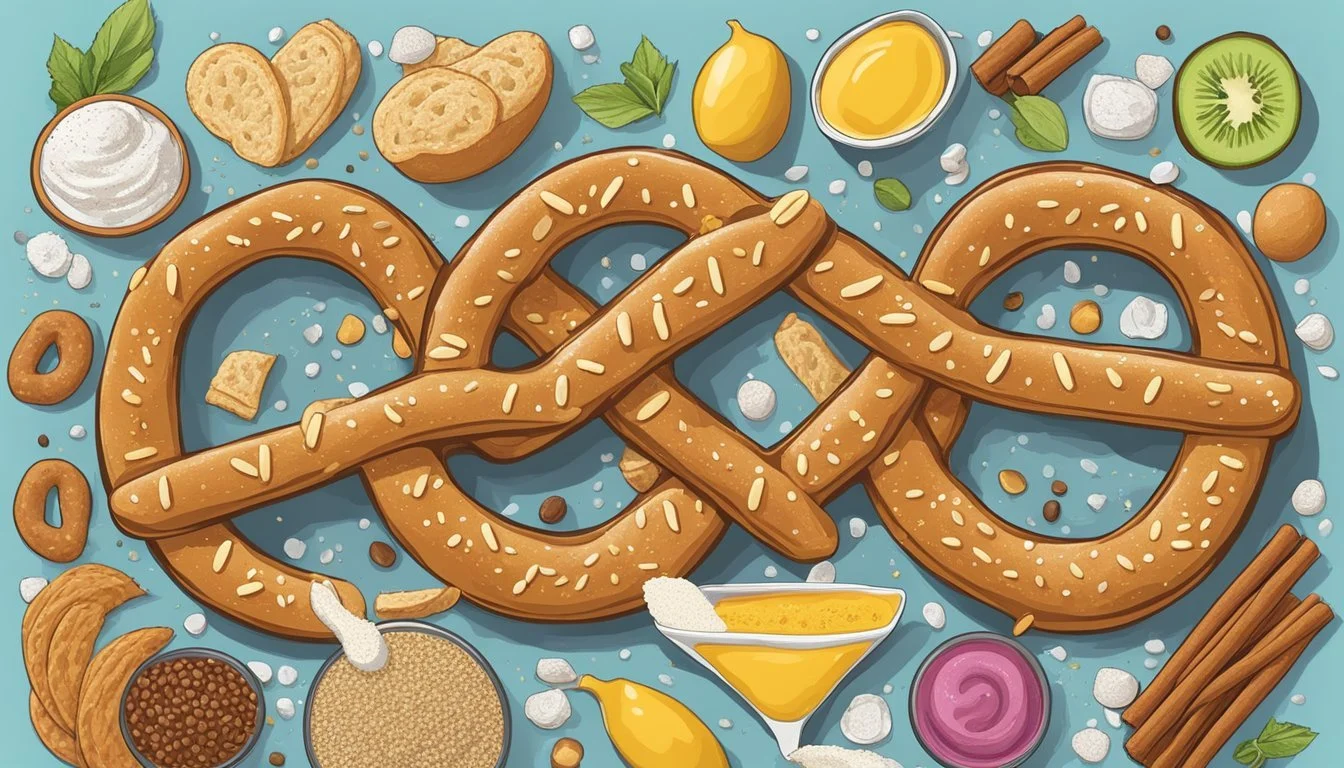Are Pretzels Vegan?
Uncovering the Ingredients and Varieties
Determining whether pretzels meet vegan standards depends largely on their individual ingredients. The basic components of pretzels include flour, water, yeast, and salt, all of which align with a vegan diet. However, vegans must be cautious as certain store-bought pretzel variations might contain non-vegan ingredients like cheese, milk, honey, or butter. Furthermore, flavored and filled pretzels often have additional additives that could be derived from animal products, making them unsuitable for a vegan lifestyle.
It is essential for vegans to inspect pretzels labels carefully. For example, some brands produce chocolate-covered pretzels or pretzel sandwiches that include dairy, therefore excluding them from being vegan-friendly. On the other hand, many hard pretzels and plain, salted varieties can cater to vegan dietary requirements—provided they have not been brushed with butter or other animal products for added flavor.
As the vegan lifestyle gains popularity, more brands are now offering vegan pretzel options, labeling them accordingly to make selection easier for consumers. Mini pretzels, pretzel sticks, and gluten-free versions are also available, giving vegans a wider range of choices. These products highlight the food industry’s responsiveness to the growing demand for plant-based snack options.
Pretzel Overview
Pretzels come in many forms, from traditional soft to crunchy hard varieties, and have evolved over time through history, ingredients, types, and production methods. This section provides an overview of pretzels' past and present, encompassing both soft and hard pretzels, and the various forms they take in contemporary snack culture.
History
Pretzels have a storied history, believed to originate in Europe during the Early Middle Ages. Monks are credited with creating pretzels from leftover dough, using the shape to represent arms crossed in prayer. This humble bread product has since become a global phenomenon, present in various cultures and regions.
Types of Pretzels
Pretzels can be broadly categorized into two types: soft pretzels and hard pretzels. Soft pretzels are often found in places like Auntie Anne's and are commonly enjoyed fresh and warm. In contrast, hard pretzels which include traditional sourdough hard pretzels, pretzel sticks, and mini pretzels, are typically shelf-stable and found packaged in stores. Flavored pretzels, such as mini pretzels, dipping sticks, and even pretzel sandwiches, expand the category with a variety of tastes.
Ingredients
The classic ingredients in pretzels are simple: water, flour, yeast, and salt. However, contemporary varieties, especially flavored pretzels, may include additional ingredients like sugars, fats, and artificial flavorings. Some specialty pretzels may also incorporate seeds, nuts, or cheeses for enhanced flavor profiles.
Production Process
The production process for making pretzels generally involves creating a dough, shaping the pretzel, and then subjecting it to a unique alkaline boiling bath before baking, which contributes to its distinct texture and flavor. The baking time and temperature can vary widely between hard and soft pretzels, with soft pretzels requiring a shorter baking time at a higher temperature, and hard pretzels baked longer at a lower temperature to achieve their characteristic crunch.
Veganism Basics
Before delving into the specifics of vegan pretzels, it is essential to understand the fundamental principles of veganism and the common ingredients that are not considered vegan.
What Does Vegan Mean?
Veganism is a dietary and lifestyle choice characterized by the exclusion of all animal products, including meat, dairy, eggs, and any derivatives thereof. Individuals who follow a vegan diet opt for plant-based alternatives in order to avoid ingredients derived from animals. Vegan-friendly products are those which do not contain animal products or by-products and are suitable for vegan consumption.
Common Non-Vegan Ingredients
When examining food products for vegan compliance, there are several non-vegan ingredients that consumers must be wary of:
Dairy products: This includes milk, butter, cheese, and yogurt, which are derived from the milk of animals, predominantly cows.
Eggs: Often included in baked goods, eggs are avoided in vegan diets.
Honey: Sourced from bees, honey is an animal by-product and not considered vegan.
The table below highlights additional common non-vegan ingredients to look for on labels:
Non-Vegan Ingredient Found in Vegan Alternative Gelatin Various sweets Agar-agar Whey Protein bars Soy/rice protein Casein Some cheeses Nutritional yeast Albumen Pastries Flaxseed meal
The consideration of these ingredients is especially pertinent when assessing whether foods like pretzels align with a vegan diet.
Vegan Diet and Pretzels
Navigating through snack options can be challenging for individuals following a vegan diet, yet pretzels often emerge as a potential vegan-friendly choice. This section explores pretzels in the context of a vegan diet, including their ingredients and how to identify or create vegan-friendly pretzel options.
Are Pretzels Vegan?
Traditionally, pretzels are made from a simple mixture of flour, water, yeast, and salt; ingredients that are inherently vegan. However, commercial pretzels sometimes include non-vegan ingredients such as butter, milk, whey, or honey, particularly in flavored or glazed varieties. It is crucial to scrutinize product labels for these additives, as they can disqualify pretzels from being considered vegan.
Identifying Vegan-Friendly Pretzels
When determining if pretzels align with vegan dietary restrictions, one must diligently:
Read Labels: Inspect ingredient lists for animal-derived components.
Look for Certification: Seek out packages with a certified vegan mark, which confirms the absence of animal products.
Research Brands: Some brands specialize in vegan snacks and may offer vegan pretzels.
Brand Vegan-Friendly Range Snyder's GF Mini Pretzels, GF Pretzel Sticks, etc. Other Brands May offer original or specifically vegan varieties
Homemade Vegan Pretzel Recipes
For vegans who prefer making their own snacks, numerous recipes exist for creating pretzels at home. These recipes often substitute non-vegan ingredients with plant-based alternatives like plant milks or vegan butters. A homemade recipe allows for full control over the ingredients, ensuring that the final product complies with vegan standards. Here are some key components for a basic vegan pretzel recipe:
Dough: Mix flour, water, salt, sugar, and yeast. Use plant-based milk for richness if desired.
Baking Soda Bath: Dip the shaped pretzels before baking to achieve the traditional texture and flavor.
Vegan Toppings: Sprinkle with coarse salt or sesame seeds before baking.
Pretzel Ingredients Analysis
In analyzing the ingredients that make up pretzels, it's essential to discern not only the base components of the dough but also both common and potentially non-vegan additives that could alter a pretzel's vegan status.
Examining Dough and Flour
Pretzel dough is traditionally comprised of wheat flour, water, yeast, and salt. Flour, the foundation of pretzel dough, is most often vegan, being simply milled wheat. Whole wheat flour and refined flour are the two primary types used, with the latter having the bran and germ removed during processing.
Dough Ingredients:
Flour: Usually wheat flour; could be gluten-free for those with allergies.
Water: Essential for dough formation.
Yeast: A leavening agent that is inherently vegan.
Salt: Adds flavor and regulates yeast fermentation.
Common Additives
There are several common additives in pretzels that may affect their vegan status.
Malt contributes to the browning and flavor.
Fats such as oils or added fats from plant origins are commonly added to enhance the texture.
Sweeteners like sugar and corn syrup provide a subtle sweetness.
The presence of gluten in traditional pretzels is a consideration for those requiring gluten-free options; alternative flours must be used in these cases.
Potential Non-Vegan Ingredients
Several ingredients commonly found in some pretzel variants could compromise their vegan status. Animal-derived products such as milk, butter, cheese, honey, and eggs are often used in flavored or gourmet varieties to add richness or a specific taste profile.
Non-Vegan Toppings/Ingredients:
Butter or margarine (if derived from animal milk)
Milk ingredients or actual milk
Cheese coatings or fillings
Egg washes used for a glossy finish
Honey for sweetness
Consumers seeking vegan pretzels should pay careful attention to these ingredients on packaging labels.
Nutritional Considerations
When exploring pretzels in the context of a vegan diet, it's essential to consider their nutritional profile, specifically the health benefits they may provide, their caloric content, and how they align with various dietary restrictions.
Health Benefits
Pretzels can offer a source of energy due to their carbohydrate content. They may also contain minerals such as iron and magnesium, depending on the type of flour used. However, as pretzels are often made from refined flour, they can lack significant nutritional value in terms of vitamins and dietary fiber unless they are specially fortified or made from whole grains.
Caloric Content
A typical serving of pretzels (about 30 grams) can carry between 100 to 150 calories, mainly from carbohydrates. While this calorie range is moderate, it can contribute to a balanced diet when consumed in appropriate portions. Pretzels high in added sugars or toppings may have a higher caloric impact.
Dietary Restrictions
Pretzels can cater to a range of dietary restrictions, including dairy-free and vegan diets, as they generally do not contain animal-derived ingredients. However, consumers with gluten sensitivities should seek out gluten-free options, as traditional pretzels contain gluten from wheat flour. Additionally, pretzels can contain sodium hydroxide in the outer coating, which some individuals may prefer to avoid for wellness reasons. Understanding food labels is crucial as sodium content and potential non-vegan additives like dairy derivatives can be present, despite the predominantly plant-based nature of plain pretzels.
Allergens and Safety
When considering vegan pretzels, it's important to acknowledge the potential for cross-contamination with allergens and the use of ingredients like dairy products, which are common allergens. Specific brands like SuperPretzel may provide allergen information and address cross-contamination risks in their manufacturing process.
Risk of Cross-Contamination
Cross-contamination can occur when pretzels come into contact with non-vegan substances during manufacturing. For example:
Shared Equipment: Pretzels may be produced on equipment also used for dairy-containing products.
Facility: Facilities processing pretzels alongside non-vegan foods could lead to cross-contamination.
SuperPretzel, among other brands, takes measures to minimize cross-contamination but consumers should verify with the brand for their specific protocols.
Allergy Information
Pretzels can contain allergens, and it's crucial for consumers to review ingredient lists and allergen statements. Common allergens include:
Dairy Products: Milk or cheese sometimes found in flavored pretzels.
Bone Char: Rarely, processed sugars used in pretzels might be whitened using bone char.
Manufacturers typically provide allergen information on packaging, but consumers may need to contact the manufacturer for comprehensive details.
Ethical and Environmental Factors
In the context of pretzels being vegan, ethical and environmental considerations play a significant role. Consumers seeking vegan pretzels often have concerns about animal welfare and the ecological footprint of their food choices.
Plant-Based Alternatives
Vegan pretzels exclude animal products such as dairy, ensuring that they align with the ethical standards of veganism which oppose animal exploitation. Plant-based alternatives to ingredients like butter include options such as dairy-free margarine or oils. These alternatives also avoid the use of bone char, often associated with the processing of white sugar, by opting for unrefined or organic sugar sources.
Substitutes for dairy products in pretzels include:
Dairy-free margarine
Vegetable oils
Bone char-free sugar
Environmental Impact
The production of plant-based foods like vegan pretzels generally requires fewer resources and is associated with a lower environmental impact compared to foods containing animal products. The absence of dairy products not only addresses animal welfare but also reduces water usage and greenhouse gas emissions, directly contributing to a more sustainable food system.
Environmental benefits of vegan pretzels:
Reduced water footprint
Lower greenhouse gas emissions
Flavorings and Toppings
When considering the vegan status of pretzels, scrutinizing the flavorings and toppings is crucial. Different additives can transform a standard vegan pretzel into a non-vegan snack.
Exploring Pretzel Flavors
Many pretzel flavors are derived from plant-based ingredients, making them suitable for a vegan diet. Common vegan-friendly flavors include garden vegetable, salt, and sugar which are often used to enhance the taste of pretzels without the use of animal products. However, flavors such as honey wheat, honey mustard, and cheddar cheese are not vegan due to their inclusion of honey or dairy-based cheese.
On the other hand, pretzels labeled with seemingly non-vegan flavors like parmesan garlic or buttermilk ranch might still be vegan if they are made with plant-based substitutes. One must carefully check product labeling or ingredient lists to confirm their vegan status. Flavors such as peanut butter filled, while potentially vegan, require verification as some peanut butter fillings may contain dairy products.
Popular Vegan Toppings
Vegan toppings for pretzels can greatly vary and include simple plant-based ingredients to more complex vegan versions of traditionally non-vegan flavors:
Mustard sauce: Often vegan, as it typically contains vinegar, water, mustard seeds, and spices.
Hot buffalo: Can be made vegan by using plant-based ingredients instead of butter or dairy.
Jalapeño: Generally vegan when used as a simple topping.
Ranch: Traditional ranch is not vegan, but vegan alternatives use plant-based creamy bases.
Vegan Cheese: A dairy-free alternative to traditional cheese, often made from nuts or soy.
It's important to note that even when the base product is vegan, some toppings and coatings might include dairy or other animal products. Always check the ingredient list for non-vegan items like honey, diary, or cheese. Opt for clearly labeled vegan-friendly products or toppings confirmed to be plant-based to avoid animal-derived ingredients.
Pretzels and Snacking
Pretzels serve as a versatile snack option, often aligning with vegan dietary choices depending on the brand and variety. Shoppers can find an array of pretzels from popular brands, making it easy to accommodate a vegan lifestyle without sacrificing enjoyment.
Vegan Snack Options
Rold Gold, Snyder's, and Snack Factory are major pretzel brands that offer vegan-friendly varieties. Rold Gold pretzels often fit vegan criteria, particularly their classic twists and sticks. Examining ingredient labels is crucial, as some flavors may include non-vegan additives like cheese or honey.
Snyder’s pretzels also provide vegan options such as their traditional twists.
For those seeking a lighter, crispier texture, Snack Factory offers Pretzel Crisps, many of which are vegan.
Consumers should be aware of variations that may incorporate dairy or egg products, such as those found in some flavored pretzels or softer options like Auntie Anne’s pretzels, which may be brushed with butter.
Pretzel Brands and Varieties
Not all snack brands offer vegan pretzels, but many popular companies have vegan-friendly options in their product lines.
Utz pretzels are often vegan, with their conventional twists and sticks abstaining from animal-derived ingredients.
Snyder's has a wide range of options, including their hearty braided twists that are typically vegan.
Goldfish pretzels, known for their distinctive fish shape and appeal to children, are another vegan-friendly choice.
In contrast, shoppers should exercise caution with products like Auntie Anne's pretzels, which are commonly brushed with butter, though certain locations might offer a vegan version by special request. Always read the ingredients or inquire at the point of purchase to ensure they meet vegan standards.
Pretzel Recipes and Cooking Tips
Creating vegan pretzels requires specific ingredients and techniques to ensure the final pastry maintains the authentic taste and texture of traditional pretzels. This section provides guidance on simple recipes and necessary cooking tips for making delicious vegan pretzel treats.
Simple Vegan Pretzel Recipes
A basic vegan pretzel dough consists of water, oil, and wheat flour to create a pliable base. It's important to begin by combining warm water with a sweetener—like sugar or maple syrup—and active dry yeast to activate the fermentation. Once frothy, one adds the oil and flour to form a soft dough. Some recipes may call for a mixture of all-purpose and whole wheat flour to achieve a wholesome texture. Key steps include allowing the dough to rise until doubled in size, followed by shaping into the traditional pretzel form.
During the preparing process, one should boil the pretzels briefly in a baking soda water solution before baking. This wash gives pretzels their characteristic dark, glossy crust and distinctive taste. For home cooks, a baking soda solution is a safe alternative to the traditional lye solution used in commercial settings.
Baking and Cooking Techniques
Preheating the oven to a high temperature, usually between 450°F (230°C) and 475°F (246°C), is essential for achieving the perfect bake. Vegan pretzels should be baked on a tray lined with parchment paper to prevent sticking, typically for about 10-15 minutes, until they achieve a golden-brown color.
Another crucial technique involves the application of a wash before baking. While traditional recipes use an egg wash, vegan variations can use a plant-based milk or butter wash to enrich the crust. Additionally, some recipes can include sourdough or SuperPretzel variations, involving different types of flour and leavening methods to cater to diverse preferences.
A proper vegan pretzel recipe delivers a balance of a chewy interior and a crisp exterior, ensuring that those following a plant-based diet can also enjoy this iconic pastry. Cooking times and techniques may vary slightly, so it's important to monitor the pretzels closely during baking.

